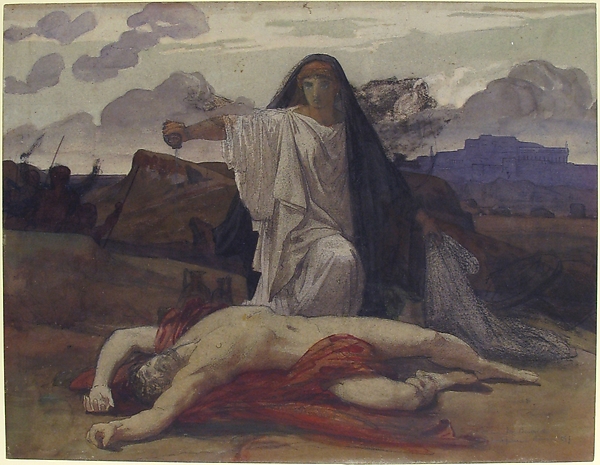What You Need to Know Before Reading Antigone
The basic bailiwick material of theAntigoneis drawn from Greek mythology. Several ancient epic poems known every bit the Theban Cycle, now lost, dealt with the family history of the house of Oedipus. Aeschylus too equanimous a trilogy about the tragic history of the Theban family, of whichSeven Against Thebesis the merely surviving play. At that place existed dissimilar versions of the same myth, as authors chose to focus on different aspects of the material. It is not sure whether any other versions centered around the denial of burial to Polyneikes equally theAntigonedoes, but it seems to take been Sophocles' innovation. The motif of the irreplaceability of a brother – as opposed to that of a husband or child – points to familiarity with Herodotus'Histories, in which text nosotros detect a similar argument.
 Antigone Gives Token Burial to the Body of Her Brother Polynices by Jules-Eugène Lenepveu, c. 1835-98. (Metropolitan Museum, NY) Sophocles wrote three tragedies nearly Oedipus' family, though they were never written or performed as a continued trilogy. They include the following:Oedipus Male monarch, in which Oedipus discovers he has unwittingly killed his own father and married his ain mother;Oedipus at Colonus, in which a blinded Oedipus is accompanied by daughter Antigone in exile, whilst conflict brews between ii sons over succession to the throne of Thebes; andAntigone, which deals with the aftermath of this conflict. The Theban saga is one of the well-nigh attested subjects in Greek iconography.
Antigone Gives Token Burial to the Body of Her Brother Polynices by Jules-Eugène Lenepveu, c. 1835-98. (Metropolitan Museum, NY) Sophocles wrote three tragedies nearly Oedipus' family, though they were never written or performed as a continued trilogy. They include the following:Oedipus Male monarch, in which Oedipus discovers he has unwittingly killed his own father and married his ain mother;Oedipus at Colonus, in which a blinded Oedipus is accompanied by daughter Antigone in exile, whilst conflict brews between ii sons over succession to the throne of Thebes; andAntigone, which deals with the aftermath of this conflict. The Theban saga is one of the well-nigh attested subjects in Greek iconography.
Though the play is set in a distant mythological by, Sophocles infused the story with ideas and questions relevant to his time. By the 440s, autonomous credo had taken deep root in Athens, and with it came certain values: citizens were encouraged to be loyal to thepolisand its laws,and to place this loyalty above their private family interests. Citizens should furthermore enjoy the liberty to vote and speak as they wished, and public officials could exist held accountable for their deportment. Some tensions yet persisted in society, and at that place was always the danger of a counter-coup by aristocratic figures who might re-establish tyrannical rule. Punishments for traitors to the democratic social club were harsh; it was not permitted to bury their torso within the boundaries of thepolis.
The wealth and prestige of Athens had also drawn a diverse group of thinkers to the city. The sophists spread ideas of relativism and challenged traditional ideologies. Though a office of the population was still very traditional, more and more people started to raise questions about religious practices, the cosmos and nature, morality and the laws of civilization. Sophocles' audience would have held a diverse range of political, moral and religious beliefs. Since information technology might have been agonizing to stage such tensions in an Athenian setting, tragedy tended to locate its stories in Thebes, an ancient enemy of Athens, which served equally a safe space to explore cultural and ideological error lines. The afar setting made it possible for Sophocles to engage his audience in questions pertaining to their own lodge, such as revenge against 1's enemies and the limits of state authorization and that of human and divine laws. TheAntigonedoes not offer whatever concluding answer to what is right and what is wrong, encouraging the audition to continue this contend once the play is over.
It has been noted that the characters in Sophocles' tragedies are oft isolated figures. This is particularly the case for Antigone. The chorus is usually intended to direct the audience's reception of the events onstage; in theAntigonethey are Theban elders, much closer in identity to Kreon than to the young female heroine. They act equally the voices of normality, only they can also be rather obtuse. The audience, every bit a upshot, is continuously moved to question where its sympathies lie and what constitutes an appropriate reaction to the unfolding tragedy.
TheAntigoneis a compact play, both thematically and temporally: the bulk of the action occurs inside a few hours. Sophocles proves himself a master of lyric storytelling: the furious confrontations between characters are rendered instichomythia(alternate verses), while in thekommoi(lyrical songs of lament) the characters tin fully explore their emotional turmoil. The messenger-speeches, in turn, provide the narrative climax. The six choral odes in theAntigoneare counted among the richest and almost beautiful of Greek lyric poesy. They are also surprisingly ambiguous, not necessarily relating to the tragic events in the rest of the play and tin therefore provide an endless source of interpretation.
Since the eighteenthCentury, theAntigonehas continuously been 1 of the virtually read, performed, and adapted plays in all of dramatic literature. It is not just discussed in Greek tragedy courses, but likewise used to explore political theory, gender dynamics and various religious and moral problems.
Written past Barbara Vinck, Ph.D. candidate, Classics, Columbia Academy
Works Consulted:
R. Blondell.Sophocles' Antigone. Focus Publishing (1998)
M. Griffith, ed.Sophocles: Antigone.Cambridge Academy Press (1999)
Source: https://www.college.columbia.edu/core/content/historical-context-antigone
Belum ada Komentar untuk "What You Need to Know Before Reading Antigone"
Posting Komentar